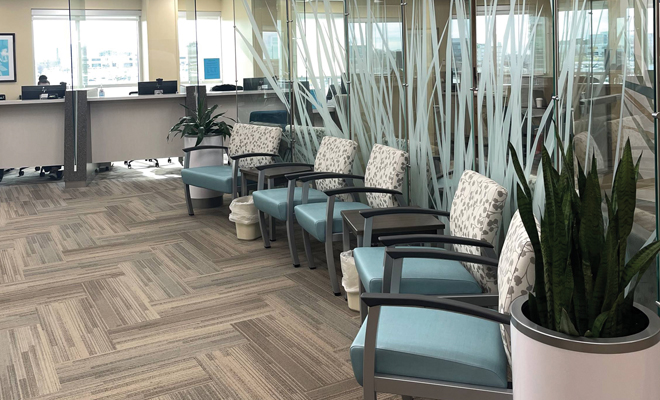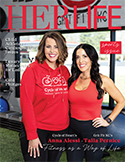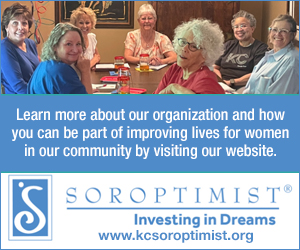
The University of Kansas Health System’s Center for Advanced Vascular Care: New Location Provides Comprehensive Vein Care
Did you know that your varicose veins and spider veins may be hereditary? Or that painful varicose veins on your legs can be easily removed, and the procedure may be covered by insurance? The talented team at The University of Kansas Health System’s Center for Advanced Vascular Care can improve your life in ways you might not realize.
Dr. Jenny Cho is one of the four experienced medical professionals specializing in vein care at the Center for Advanced Vascular Care. She has been with the current group for 11 years, and she’s happy to be in the new, larger facility that opened November 1, 2021.
Expanded Care
“Our new vein care services are located on the Indian Creek Campus of The University of Kansas Health System on Nall Avenue. This new location is where patients are seen for initial evaluation, diagnostic ultrasound testing is performed and vein procedures are done.” Dr. Cho noted. “One of our primary reasons to move is that we have grown. It’s a much larger facility, which is an updated version of what we were doing at a much larger scale.”
Four vein specialists work together in the Center for Advanced Vascular Care. The collaboration among the four, with their three specialties, makes them a team that can diagnose and care for any patient’s need. “I am a vascular surgeon, as is Dr. Richard Arnspiger. Dr. Adam Alli is an interventional radiologist; Dr. Georges Hajj is an interventional cardiologist,” she reiterated. “We do the vein procedures in our new center using local anesthesia; we also see all the patients in the center and do the ultrasounds they need for testing. The smaller percentage who may require advanced treatments then go to the hospital for procedures that are typically outpatient as well.”
Providing Pain Relief
These vein care experts specialize in the most current technologies and techniques for minimally invasive treatment of spider and varicose veins. They treat all aspects of vein disease such as venous skin damage, ulcers, blood clots and congenital vein disorders.
Spider veins, those little red and blue veins in your legs, can be treated with sclerotherapy, in which tiny injections are made into the skin to cause them to fade. Patients with bulging varicose veins often receive a treatment called endovenous ablation, which reduces pain and inflammation, along with microphlebectomy or foam injections of the varicose veins. These are the most common procedures. “These procedures are all done within our new facility and usually take 30 minutes to complete,” she explained. “After patients recover, they are at our center about an hour or an hour and a half and can return to their normal activities very quickly. Years ago, people had to undergo general anesthesia. Now, they can relax, listen to music, have their treatment and walk out on their own!”
The team works closely with wound care centers, which refer patients who may be suffering with disease in their legs. For example, if the patient has venous ulcers, our vein care team provides treatment to help heal the ulcers.
Deep Expertise
Dr. Adam Alli has additional expertise in treating complicated congenital vein disease procedures, pelvic congestion syndrome and intravenous treatment of deep venous thrombosis. As an interventional radiologist, he performs these procedures in the hospital following diagnosis at our location on the Indian Creek Campus. Dr. Georges Hajj, as an interventional cardiologist, also treats heart and vascular disease, which is often diagnosed first at the Center for Advanced Vascular Care, providing office evaluation and cardiac testing. Dr. Richard Arnspiger and Dr. Jenny Cho, as vascular surgeons, also treat arterial diseases such as aneurysms and occlusive disease with operative repair and bypass surgeries.
“Varicose vein issues typically affect 20 to 25 percent of women. This does affect men, but it is a little more prevalent in women, especially those who have had multiple pregnancies,” she related. “In the past, a lot of varicose vein disease were labeled cosmetic. We now know that they cause symptoms in patients that are real, including pain, achiness, fatigue, heaviness and swelling in legs. Our goal is to help people have healthier and more comfortable legs. Because of that, many insurance companies will cover the procedures.”
Dr. Cho has seen people of all ages, from teenagers to women in their nineties, who suffer from varicose veins. As bodies age, vein disease worsens. It is not diet-related and there is no medication to stop it. She has treated marathon runners in the best shape of their lives for hereditary vein disease. “Standing and not moving around, and prolonged sitting can increase symptoms,” she related. “Exercise can help alleviate some of these symptoms because it causes your muscles to pump and helps squeeze the veins. But, when you are ready for a real solution, come see us!”
Diagnosis is the best way to prevent serious health issues, and the Center for Advanced Vascular Care may be the first step on your journey to a more enjoyable, fulfilling life. →
The University of Kansas Health System’s Center for Advanced Vascular Care is located at 10700 Nall Avenue, Level 3, Suite 300, Overland Park, Kansas. Call 913-588-1227 and visit kansashealthsystem.com for more information.









